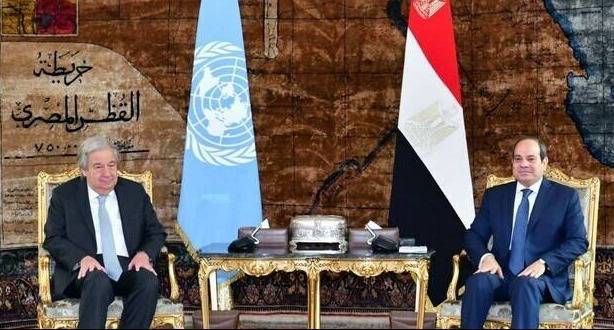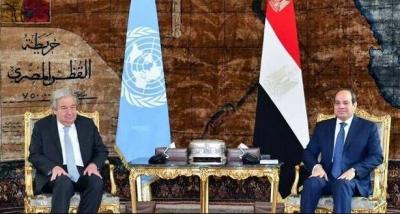Egyptian President Abdel Fattah Sisi and United Nations Secretary-General Antonio Guterres discussed developments in Gaza, asserting their rejection of the displacement of Palestinians and warning against any actions in Rafah due to their potentially catastrophic consequences. Presidential spokesperson Ahmed Fahmy stated that the meeting, which included Foreign Minister Sameh Shukry, General Intelligence Chief Abbas Kamel, UNRWA Commissioner General Philippe Lazzarini, and UN Resident Coordinator in Egypt Elena Panova, addressed various international and regional topics, with a focus on the situation in the Gaza Strip.
Sisi presented intensive efforts aimed at achieving an immediate ceasefire, the exchange of detainees, and the enforcement of sufficient humanitarian aid to assist those affected in the region, whether through land routes in coordination with relevant UN agencies or via air drops, particularly to northern areas of the Strip. He commended Guterres' stance on the ongoing crisis and his commitment to international law and humanitarian law principles, as well as his continuous efforts to urge the international community to act to end the war and protect civilians.
Sisi emphasized the need for the Security Council to fulfill its responsibilities and stressed the seriousness of some countries cutting their support for the UN Relief and Works Agency for Palestine Refugees in the Near East (UNRWA), viewing it as collective punishment for innocent Palestinians. The Egyptian presidential spokesperson noted a consensus during the meeting regarding the seriousness of the situation and the necessity of avoiding factors that could escalate the conflict, as well as a complete and firm rejection of the displacement of Palestinians from their lands and warnings against any military operation in Palestinian Rafah, given the already deteriorating situation. Sisi and Guterres also underscored the necessity of the two-state solution as the only path to achieving justice, security, and stability in the region and highlighted the need to create conducive conditions for its activation.




